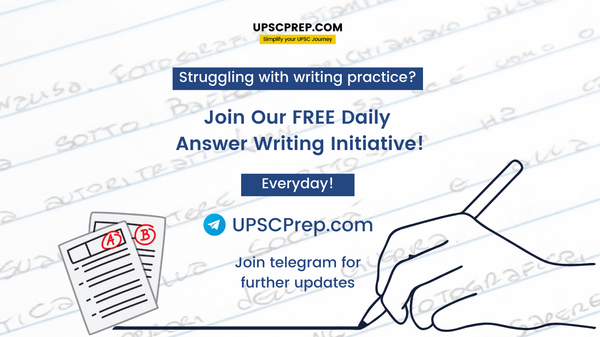Subject: GS 2
Syllabus: Indian Polity and Constitution
Questions
- “It is said that constitutionalism pervades the Indian Constitution”. Examine the statement. (150 Words, 10 Marks)
- Critically analyse the significance of the Speaker's role in the functioning of the Indian Parliamentary Democracy. (150 words, 10 marks)
Download Model Structures PDF
Model Structures
Q1. “It is said that constitutionalism pervades the Indian Constitution”. Examine the statement. (10 marks)
(This question is simply asking to explain: "How the concept of constitutionalism is present throughout the Indian Constitution.")
Introduction:
- Constitutionalism is a set of political values and aspirations that reflect the desire to protect liberty through checks on government power. It means government according to the rule of law as opposed to arbitrary government.
- Constitutionalism is a philosophy which is essential for a democratic setup. It ensures that the freedoms of the individual are given primacy and the State does not encroach upon the liberty of the citizen.
Main Body:
Principles and norms which promote constitutionalism in India are:
- A written constitution containing the fundamental principles of governance and detailed administrative provisions.
- Constitutional Supremacy means that no laws or actions can violate a nation's Constitution.
- The Constitution provides a set of fundamental rights to every citizen, protecting individual freedoms and promoting equality.
- It also sets forth Directive Principles of State Policy, guiding the government to ensure social and economic justice.
- The Constitution's ability to adapt through amendments (Article 368) while maintaining its core principles demonstrates its strong foundation in constitutionalism.
- The preamble holds the spirit of constitutionalism, as it contains all the objectives of the constitution and conditions for a dignified life of citizens.
- An independent judiciary with the power of Judicial Review under Article 13 for upholding the rule of law and for safeguarding constitutional principles.
- The doctrine of separation of Power ensures all organs enjoy limited power within their framework. It creates a system of checks and balances among the actions of governmental organs.
- Free and fair elections to legislature and a democratic government accountable to the electorate. Independent Election Commission.
- Federalism, i.e. division of power between the centre and states, ensures diffusion of powers, necessitating different independent centres of decision-making.
- Decentralisation of power, i.e. power conferred on the institution within the state, is sufficiently dispersed so as to avoid abuse of power.
Conclusion:
- In I.R. Coelho vs the State of Tamil Nadu, the Supreme Court held that the principle of constitutionalism is now a legal principle.
- The constitution seeks to decentralise power in India instead of concentrating it at one point. Thus, India does have not only a constitution but also constitutionalism.
Q2. Critically analyse the significance of the Speaker's role in the functioning of the Indian Parliamentary Democracy. (10 Marks)
Introduction
- “The Speaker represents the House. She represents the dignity of the House, the freedom of the House and because the House represents the nation, in a particular way, the Speaker becomes a symbol of the nation’s freedom and liberty.” (Pt. Nehru) (Quote-based)
- The Speaker of the Lok Sabha holds a position of pivotal importance in a parliamentary democracy like India. (General)
Main Body
Role of the Speaker
- To Ensure smooth proceedings of the house: The Speaker presides over the meetings of the Lok Sabha and conducts its proceedings.
- also presides over the joint sittings of the two Houses of the Parliament..
- Guardian of Rights and Privileges of the House: The Speaker protects the rights and privileges of the House and its members. They ensure that the dignity and the rights of the House are upheld at all times.
- Interpretation of Rules of Procedure: The business of the House is conducted according to definite and settled rules of procedure. In case of any dispute regarding the rules of the House, the Speaker interprets and applies these rules.
- To maintain discipline in the Lok Sabha: If any member disrupts or tries to disrupt the proceedings of the House, the Speaker can warn or ask him/her to leave the House. The Speaker can suspend a member from the House guilty of violating discipline and decorum.
- Representing the House: The Speaker represents the House to the President, the authorities, and the public. They certify bills that are passed by the House before they are sent to the President for assent.
- Fix the Agenda of the House: The Speaker, in consultation with other members of the business committee of the House and the Prime Minister, fixes the agenda of the meetings of the House.
- This ensures timely debates and discussions on important issues of the country.
- Regulating Debates: The Speaker decides who will speak, when, and for how long. They ensure that all points of view are heard and that debates are conducted in a fair and balanced manner.
- Conduct the business of the House: The Speaker conducts the business of the House. (E.g. allows the members to introduce the bills or to move motions, recognises the members on the floor of the House, and gives them time to speak in the House).
- Power to adjourn the House: The Speaker can adjourn the meetings of the House if the quorum of the House is not complete or if conducting the business of the House is not possible due to the disorderly behaviour of its members.
- Casting Vote: In case of a tie on any matter being voted upon in the House, the Speaker exercises a casting vote. This ensures that decisions can be made even when the members are evenly divided.
- Role in Joint Sitting: In case of a joint sitting of the two Houses of Parliament, the Speaker of the Lok Sabha presides over the session.
Criticism faced by the office of the Speaker:
- Allegations of Partisanship: The Speaker often belongs to the ruling party, and there have been instances when impartiality has been compromised.
- Discretionary Powers: Certain discretionary powers of the Speaker, like deciding on defection matters under the Tenth Schedule, have been sources of controversy. The delay in deciding such matters has sometimes been attributed to political considerations, as seen in the Karnataka and Madhya Pradesh assembly crises.
- Lack of Clarity in Rules: There is often a lack of clarity in the rules of procedure, which gives the Speaker substantial leeway, leading to accusations of arbitrariness.
- Anti-defection law: In recent times, there have been several instances where the role of the speaker has been criticised for disqualifying MLAs under the anti-defection law, and their ruling has been challenged in courts.
- Review of the Speaker’s Decisions: Under the Rules, the Speaker is not answerable to any person in performing the assigned roles. Decisions of presiding officers are final and are not open to appeal or subject to review.
- Increased disruptions: Frequent disruptions reduce the time required for important discussions and compel speakers to allocate less time for discussion. This often questions the speaker's impartiality as he allegedly provides more time to the ruling party.
- Transparency and Accountability: Some critics believe that the Speaker's decisions should be subject to judicial review to ensure transparency and accountability. The current immunity from judicial intervention in procedural matters has been seen by some as a lack of checks and balances.
Conclusion
- The Speaker is considered as the true guardian of the Indian Parliamentary democracy, holding the complete authority of the Lok Sabha. Thus, the office's impartiality is very important to make parliamentary democracy work in the true sense.

